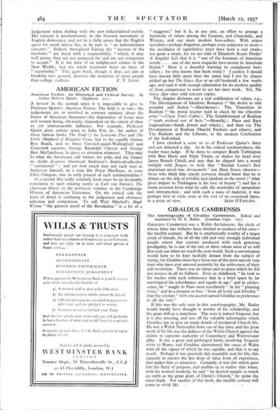AMERICAN FICTION
A REVIEW in the normal sense it is impossible to give to Professor Quinn's American Fiction. The field is so vast ; the judgements are so involved in contrary opinions about the ,future of American literature—the importance of lesser men and women being, obviously, dependent on the extent of their as yet immeasurable influence. For example, Professor ,Quinn gives serious space to John Fox, Jr., the author of :those famous books The Trail rf the Lonesome Pine and The 'Little Shepherd of Kingdom Come, but to the equally famous Rex Beach, and to those Get-rich-quick-Wallingford and Graustark creators, George Randolph Chester and George Barr McCutcheon, he gives no attention whatever. They may he what the Americans call writers for pulp, and the former no doubt deserves Sherwood Anderson's dismissal-adjective
sentimental " ; and yet how much may not such men as Anderson himself, or a man like Percy MacKaye, or even Ellen Glasgow, owe to early perusal of such sentimentalities ?
As a record this really scholarly book must be an invaluable Correlative to such existing works as Carl van Doren's The American Novel, or the pertinent volumes in the Cambridge History of American Literature. On the critical side the mass of detail is confusing to the judgement and obstructs selection and comparison. To call Weir Mitchell's Hugh Wynne " the greatest novel of the Revolution " is a bit of a " staggerer," but it is, at any rate, an effort to arrange a hierarchy of values among the Coopers, and Churchills, and Wisters, and our more modern best-sellers. With minor novelists—perhaps forgotten, perhaps even unknown to most— the avoidance of superlatives must have been a real strain ; too great a strain, for we are told of Elizabeth Stuart Phelps' A Singular Life that it is " one of the foremost of American novels . . one of the most exquisite love:stories in American fiction." Here is a dreadful warning to complacent best- sellers ; for who knows that book today ? I confess I should have known little more than the name had I not by chance picked up her The Gates Ajar at an old bookstall a few weeks ako, and read it with enough admiration for its modern quality of clean competence to want to see her later work. Yet, The Gates Ajar once sold roo,000 copies.
The chapter divisions are a real codification of values, e.g., The Development of Idealistic Romance (" the desire to mix morality and fiction "—Hawthorne) ; The Transition to Realism (" the moral teacher held in check by the objective artist "—Uncle Tom's Cabin); The Establishment of Realism (" truth evolved out of facts "—Howells) ; Place and Race (regionalism-"-Sarah Jewett and others) ; and then via The Development of Realism (Harold Frederic and others), and The Radicals and the Liberals, to the modern Celebration of the Individual.
I have checked a score or so of Professor Quinn's dates and not detected a slip. As to his critical surefootedness, the reader must judge. If he dares to compare Booth Tarkington with Bret Harte and Mark Twain, or shakes his head over James Branch Cabell, and says that he slipped into a moral
twilight with Jurgen, or feels that " Sinclair Lewis's first important novel was Arrowsmith" not Main Street, observe—
those who think him crassly perverse should know that he is always on the side of nobility and idealism in the novel (" what gives import to Tarkington is his love of beauty ") and has a
warm aversion from what he calls the morbidity of naturalism and introspection ; and with such. a mass of material, it was perhaps best to stick, even at- the cost of an occasional lapse,














































 Previous page
Previous page